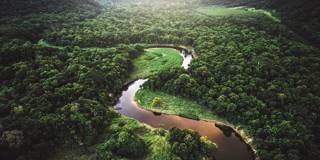Although the COVID-19 pandemic has raised our awareness of other environmental threats like climate change, the destruction of the Amazon, one of the planet's most important climate stabilizers, continues to accelerate. Reversing this dangerous trend will require urgent reforms, underpinned by an entirely new mindset.
RIO DE JANEIRO – The COVID-19 pandemic is a stark reminder of how interconnected our fates are. Many countries, cities, and communities that thought they had escaped the coronavirus have since been forced back into lockdowns, owing to the rise of dangerous new variants.
Yet for all the trauma and anguish we have endured, the pandemic also underscores our profound connection to, and reliance on, nature. As the indigenous leader and writer Ailton Krenak has put it, “We are living a suspension of senses with the juxtaposing crises. The pandemics and the climate events challenge us to think about what we are doing with our experience on Earth.”
If the crisis has a silver lining, then, it is that more governments, businesses, and communities have started to revalue the environment and embrace the transition to a green economy. But whether the underlying shift in attitudes and behavior will be enough is another question. While the pandemic brought some sectors to a screeching halt, the overall reduction in greenhouse-gas emissions was relatively modest. The world still is not on track to limit global warming to the Paris climate agreement’s target of 1.5° Celsius above pre-industrial levels.

RIO DE JANEIRO – The COVID-19 pandemic is a stark reminder of how interconnected our fates are. Many countries, cities, and communities that thought they had escaped the coronavirus have since been forced back into lockdowns, owing to the rise of dangerous new variants.
Yet for all the trauma and anguish we have endured, the pandemic also underscores our profound connection to, and reliance on, nature. As the indigenous leader and writer Ailton Krenak has put it, “We are living a suspension of senses with the juxtaposing crises. The pandemics and the climate events challenge us to think about what we are doing with our experience on Earth.”
If the crisis has a silver lining, then, it is that more governments, businesses, and communities have started to revalue the environment and embrace the transition to a green economy. But whether the underlying shift in attitudes and behavior will be enough is another question. While the pandemic brought some sectors to a screeching halt, the overall reduction in greenhouse-gas emissions was relatively modest. The world still is not on track to limit global warming to the Paris climate agreement’s target of 1.5° Celsius above pre-industrial levels.